Profession home care aide

Personal carers assist elderly and handicapped people with daily living activities at the person's home. Duties performed at a place of residence may include keeping house (making beds, doing laundry, washing dishes) and preparing meals. May advise families, and the patients/clients, on such things as nutrition, cleanliness, and household utilities.
Home care aide Jobs: Open positions
Find the job of your dreams on Talent.com, one of the largest job sites worldwide.
Job postings: talent.comPersonality Type
Tasks home care aide
- Give support to patients at home with daily living tasks such as washing, dressing, eating, drinking, transport and budgeting.
- Perform housekeeping duties, such as cooking and running errands.
- Carry out health care related tasks such as monitoring vital signs (under the supervision of registered nurses and physiotherapists).
- Administer medication orally, via rectum, subcutaneously and intramusculary.
- Transport/accompany patients to locations outside home.
- Educate family to provide bedside care.
- Report changes in patient's condition and the services offered.
- Create individual care programmes.
- Coordinate and arrange activities to enhance physical, social, emotional and intellectual development.
- Create and maintain records of the patient's progress/development and services performed.
- Consult with other health care providers about patient.
- Clean and sterilize the care equipment.
Related professions personal care
- Aged care services manager
- First line supervisor of personal care workers
- Handicapped care services manager
- Personal carer in an institution for psychiatric patients
- Personal carer in an institution for the elderly
- Personal carer in an institution for the handicapped
- Pharmacy assistant (semi-skilled)
- Psychiatric care services manager
Knowledge
- Disability types
The nature and types of disabilities affecting the human beings such as physical, cognitive, mental, sensory, emotional or developmental and the specific needs and access requirements of disabled people.
- First response
The procedures of pre-hospital care for medical emergencies, such as first aid, resuscitation techniques, legal and ethical issues, patient assessment, trauma emergencies.
- Older adults' needs
The physical, mental, and social needs of frail, older adults.
- Disability care
The specific methods and practices used in providing care to people with physical, intellectual and learning disabilities.
Skills
- Keep company
Be with people to do stuff together, such as talking, playing games or having a drink.
- Iron textiles
Press and iron in order to shape or flatten textiles giving them their final finishing appearance. Iron by hand or with steam pressers.
- Support social service users to live at home
Support social service users to develop their own personal resources and work with them to access additional resources, services and facilities.
- Prepare ready-made dishes
Get ready for serving snacks and sandwiches or heat up ready-made bar products if requested.
- Provide in-home support for disabled individuals
Assist individuals with disabilities in their own homes and with daily living tasks such as washing, dressing, eating and transport, helping them to achieve independence.
- Tend to elderly people
Help elderly people in their physical, mental, and social needs.
- Assist social service users with physical disabilities
Help service users with mobility problems and other physical disabilities such as incontinence, assisting in the use and care of aids and personal equipment.
- Make the beds
Clean sheets, turn mattresses, plump pillows and change cushions.
- Evaluate older adults' ability to take care of themselves
Assess the condition of an older patient and decide if he or she needs assistance in taking care of him- or herself to eat or to bathe and in meeting his/hers social and psychological needs.
- Apply first response
Respond to medical or trauma emergencies and care for the patient in a manner compliant with health and safety regulations, assessing the legal and ethical issues of the situation, and provide proper pre-hospital care.
- Buy groceries
Purchase ingredients, products and tools that are necessary for daily housekeeping activities.
- Monitor patient's health condition
Frequently examine the mental or physical health condition of a patient, monitor the use of medication and report on their condition to your superiors or to the patient's family.
- Support individuals to adjust to physical disability
Assist individuals to adjust to the implications of physical disability and to understand the new responsibilities and level of dependency.
- Assist disabled passengers
Use appropriate safety procedures to operate lifts and secure wheelchairs and other assistive devices while assisting physically disabled travellers.
- Prepare sandwiches
Make filled and open sandwiches, paninis and kebabs.
- Wash the dishes
Wash plates, glasses, silverware and cooking gear used for a meal, by hand or by use of a dish washer. Put everything back in its place afterwards.
- Wash the laundry
Wash or clean clothes by hand or by use of a washing machine.
- Accompany people
Chaperon individuals on trips, to events or appointments or to go shopping.
- Assist clients with special needs
Aid clients with special needs following relevant guidelines and special standards. Recognise their needs and accurately respond to them if needed.
Optional knowledge and skills
food allergies visual disability vacuum surfaces provide dog walking services use cooking techniques clean surfaces administer appointments listen actively lift heavy weights clean household linens assess risks for the elderly prevent domestic accidents handle linen in stock work ergonomically show social competences use food preparation techniques promote prevention of social isolation clean rooms prepare dietary meals hearing disability promote healthy lifestyle provide first aid mobility disability perform dusting activities assist disabled individuals to participate in community activities advise patients on health and lifestyle issues feed petsSource: Sisyphus ODB